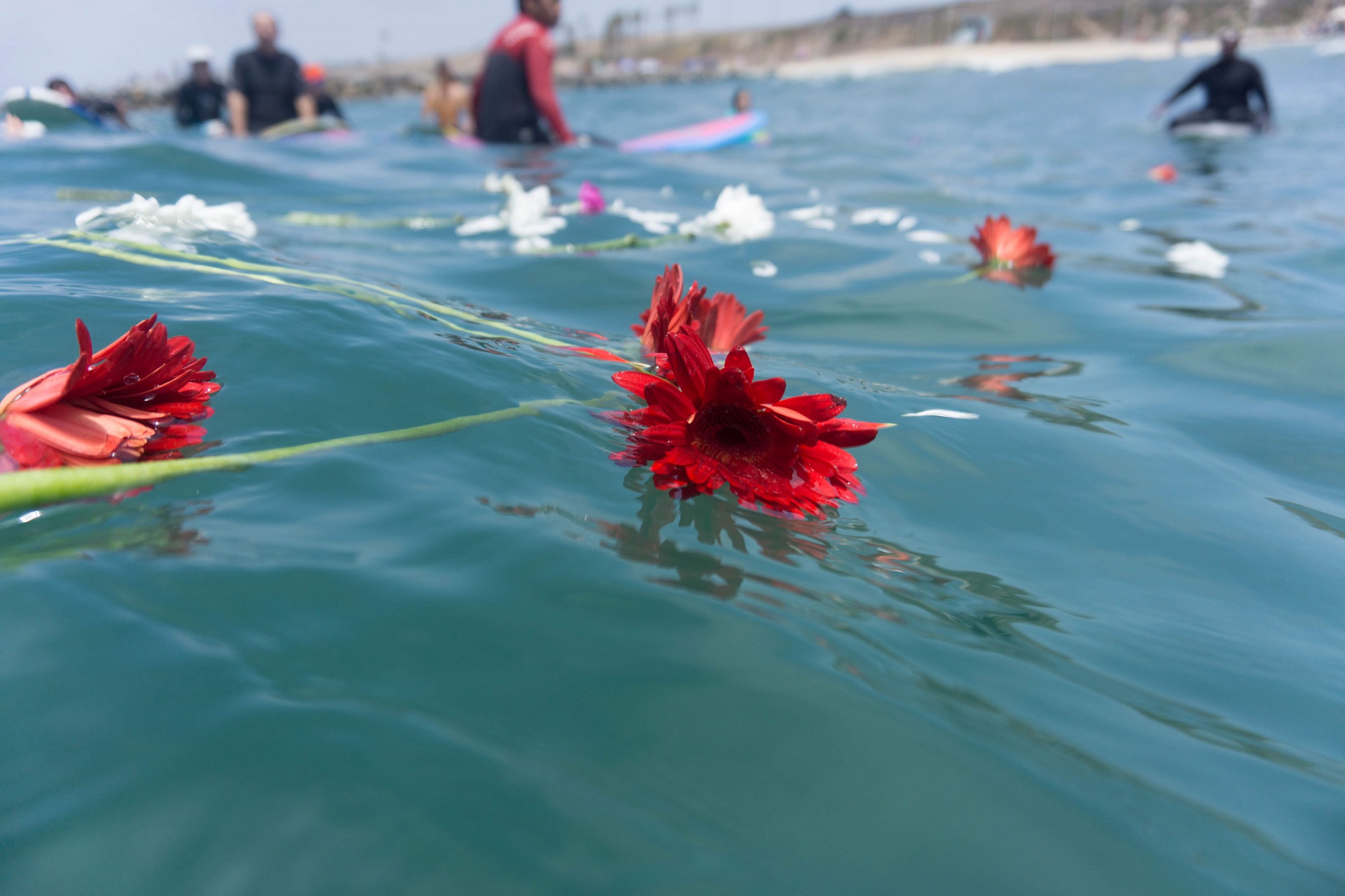
Photo by Brian Langston
Through honoring our past, we can bring healing to the present
This past year we’ve all been confronted with the fragility of life. Many loved ones have unexpectedly passed away. In trying to make sense of it all, we’ve looked to find meaning in these seemingly senseless deaths and have come to appreciate life more. Rituals are one way to honor those who are no longer with us; learning from them and transforming our lives is another that can bring purpose and healing to our lives.
The blue skies and beautifully shaped ocean waves – the kind surfers love – made for a perfect last day of Youth Mentoring Connection’s (YMC) surfing program. A special energy filled the air as people from their community gathered for their annual “Memorial Paddle Out,” a sacred surf ritual to remember those who have passed.
An altar created with sand, seashells, and sunflowers stood in the center of the space. I was struck by its simple beauty as I watched youth, mentors, and friends carefully place a photo or a rock with a loved ones’ name on the altar. As I lay down my rocks and photos, I could feel the spirit and soul of each person. It’s as if they were smiling at us knowing they were being held in this sacred space to be honored and celebrated for their life.
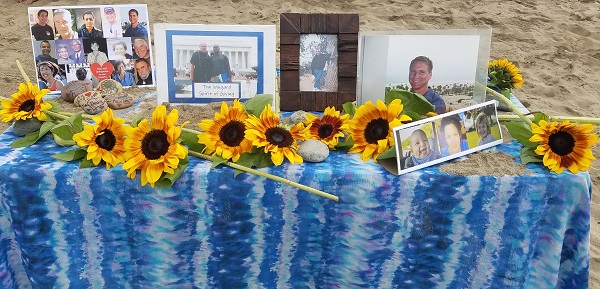
Forming a circle, Tony, CEO of YMC described this sacred surf ritual. “We paddle out for those who have passed and for our ancestors before them.” Explaining the soulful way they would honor our ancestors with the healing energy of the ocean, opened our spirits and souls to best honor our ancestors’ lives. Soon it was time for surfers to gather rocks and flowers before they started to paddle out to a quiet spot far from the ocean’s shore.
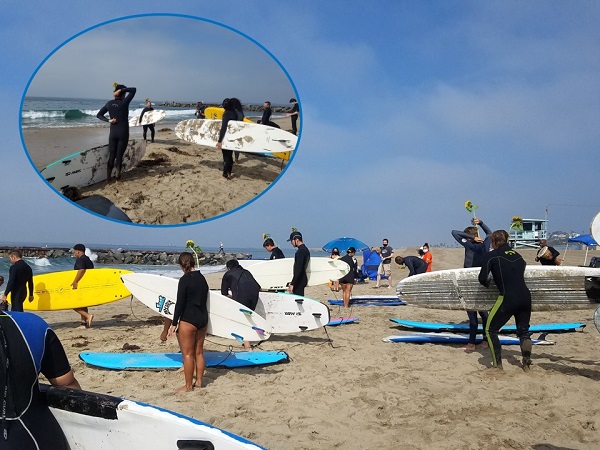
Those of us who stayed on the beach supported this sacred surf ritual by holding the space with rhythmic sound. We hit drums and played other percussion instruments which reverberated out to the surfers now forming a circle.
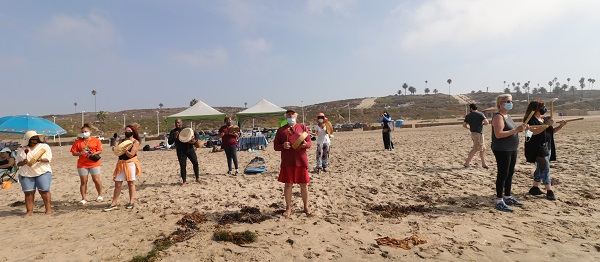
Photo by Brian Langston
Holding hands, Tony led them in prayer and song. They memorialized loved ones by calling out their names or sharing a remembrance of their life as they threw flowers and dropped rocks into the ocean. Surrounded in the beauty of community and flowers floating in the ocean, they promised our ancestors to live bigger and better lives in their memory.
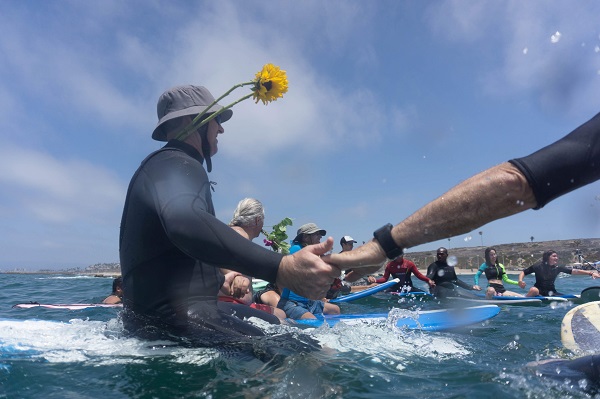
Photo by Brian Langston
From the shore, we could see the ritual ending as the surfers splashed water, a sign of celebrating our ancestors’ lives.
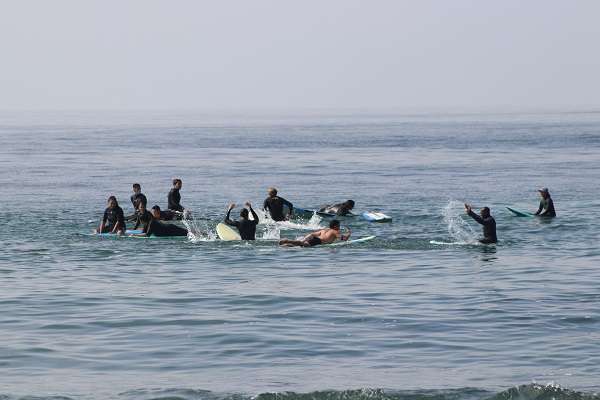
Photo by Brian Langston
As the sound of drums beating filled the air, the joy of celebration was felt as surfers rode the waves back to shore.
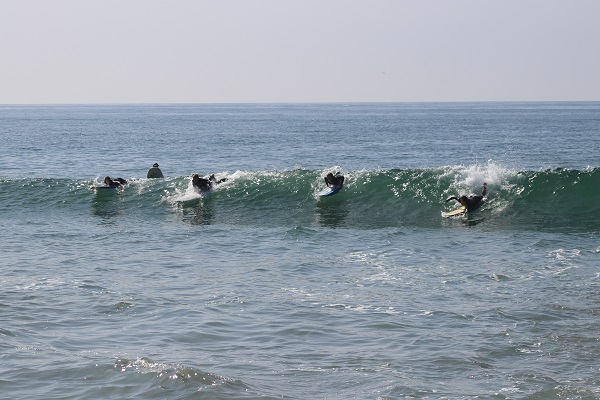
Photo by Brian Langston
Standing on the beach, I soaked in this profound ritual. To participate in such an experience can awaken new perspectives on the continuum of life, death and our relationship with others and the world. It struck me that for so many, when someone dies, something awakens within us. Their goodness rises to the top and we finally see the whole of who they are with loving kindness. We’re reminded of the good they brought into our lives and others. Our compassionate hearts open up and we’re often able to let go of our grudges, slights and soften negative judgments with understanding and forgiveness.
What if we did this when they were alive? What if we saw their goodness, gifts, blind spots, weaknesses and accepted the whole of who they are? What if each day, we let go of the slights, grudges, right/wrong judgments and instead find small ways to see their gifts, even in what we might consider to be bad behavior? Why wait until they’re gone to accept who they are; to change our reactions to how they trigger us; to hold them in our hearts?
This resonated with me. It took my younger sister, Jane’s unexpected death to wake me up and see some of the unsupportive patterns I got stuck in, in a profound way.
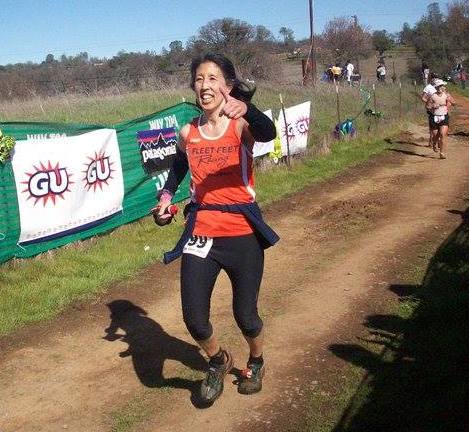
I love Jane, but as siblings, we had our strong differences. It was a Saturday when I got an urgent call from one of my other sisters to fly home to Sacramento since, living in L.A. I was the closest. Jane (a decorated marathon runner) had collapsed while running a trail and was in a comma. It was during those 17 days as my mother and I sat next to her, I saw more clearly the true goodness of my sister and the message she’d been trying to convey.
I learned how deeply she impacted others as love poured out, especially from her running community. Every day people came until the nurse had to limit the number in her room. Yet friends kept coming, waiting patiently outside her door to give their love and support. When she died, her friends raised thousands of dollars to put up a stone bench engraved with her name. Placed at the spot where she collapsed on the American River Parkway, they celebrated her life with her favorite sunflowers in a beautiful ceremony to remember and honor her life.
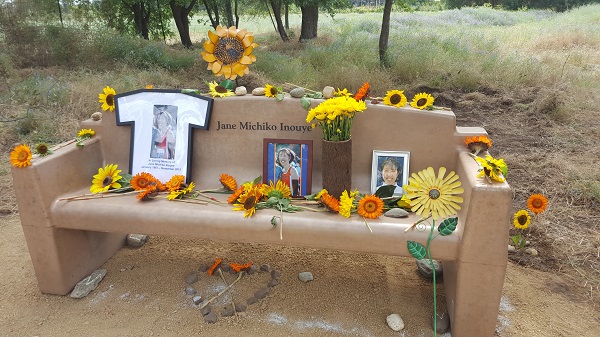
Through stories, I learned about her loyalty to others and to my mother. When my father died, she included my mother in friends’ gatherings, so everyone knew mom. I learned how she gave back in unexpected ways; transformed people’s lives through her passion for helping others and got people involved in causes she volunteered for. I discovered through my cousins that Jane was the one who stayed in touch with them.
I could feel the profound message she was sending me. She’d always encouraged me to spend more time outside of work, especially with family. Yet my passion for my life’s calling (to help leaders and their companies) often kept me from traveling home to visit or even having long conversations with family. Working hard was a value passed on by my parents, especially my father who was admired by many for the difference he made as a doctor of orthodontics. I saw the endless hours he worked to support his family and the passion he had for changing people’s lives. However, he got sick before he was able to keep his promise to travel with my mother. And the important book he was writing about his innovative methods in orthodontics was never finished.
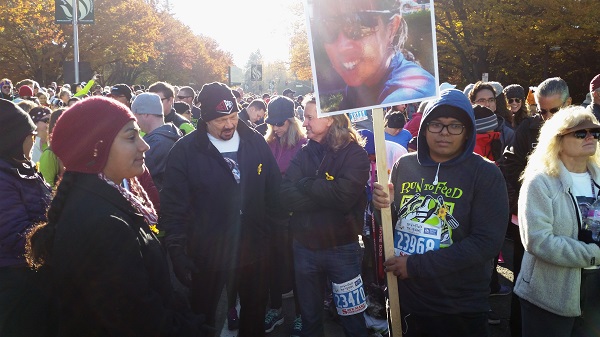
On the Thanksgiving after Jane’s passing, her running community came together to run for her. Surrounded in such love for my sister, shifted something in me. I wanted to honor her by living the message she’d left me. It’s interesting, the values and patterns of our ancestors are passed on from generation to generation – good and bad. Generations can pass on the goodness of their families or live with the same blinders of the past. Until someone does something different, the same patterns continue to exist. This is true with the racial prejudices we’ve seen for centuries.
My family’s value of working hard has served me well; yet, anything can become our weakness when it’s the only filter through which we see the world. Jane opened my eyes to see how valuable it was to find time outside of work. Since her passing, my husband and I have taken more time off traveling, especially with family. We fulfilled my dad’s promise and took my mother for the first time to our ancestors’ homeland in Japan. I published my first book in honor of Jane and my dad and his dream to publish his never-completed book. Today, I have weekly conversations with family and feel a connection that’s become quite special. And bringing more joy into my life, another thing Jane encouraged me to do, goes beyond my passion for my work and transforming lives, to the simplest things I engage in every day.
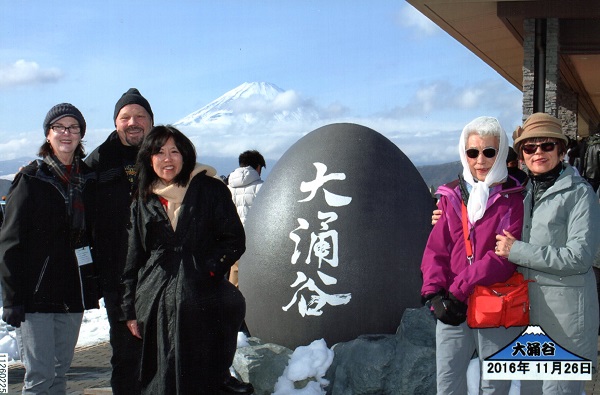
How can you honor your ancestors, by honoring the people in your life now rather than later? Here are a few ways to explore.
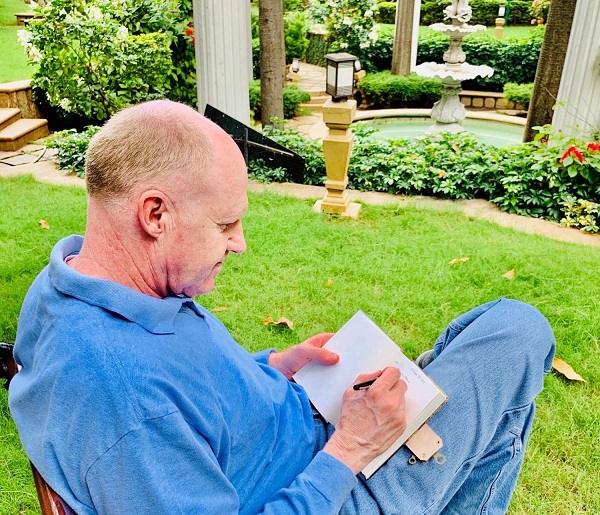
Gratitude Letters
Research shows practicing gratitude brings happiness. When we feel good about ourselves, it’s easier to find good in others. Writing gratitude letters, whether delivered or not, improves one’s mental health. Writing words of appreciation of how someone has blessed our lives shifts our attention away from negative experiences to positive ones and if sent, touches another’s heart with our goodness in a deep and profound way

Photo by Christina Morillo from Pexels
Our gifts are what we do naturally well. By shifting from judging to observing with curiosity, it’s easier to notice gifts in others. Appreciating what someone does, and its impact, lets them “know” they’re valued. Acknowledging the gift behind their actions lets them “feel” a deep connection, not only to you but often to their own self . Studies show when organizations have a positive-to-negative ratio greater than 3:1, they’re significantly more productive.
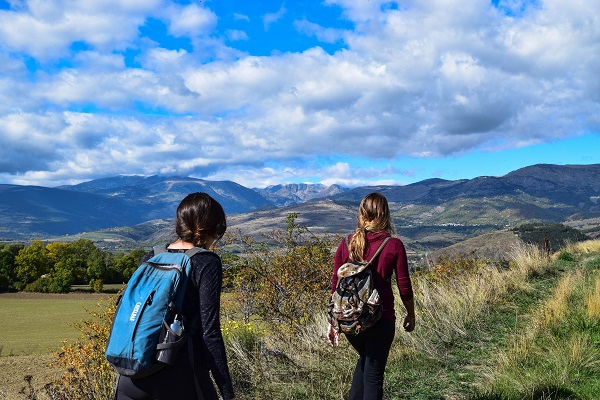
Studies show spending time in nature can change one’s mood from depressed or stressed to calm and balanced. This practice, done mindfully quiets your mind, connects into your heart’s intelligence and brings you to a centered state. It connects you into feelings of gratitude and kindness, making gratitude practices easier to do.
We can learn from our ancestors, their gifts and goodness to their fears and blind spots. We can break the unsupportive patterns they passed on and replace them with ones that support and affirm. We can take their goodness and carry that forward, using our gifts to make it better. In the process, we can learn the lessons they couldn’t learn in their lifetime and break the cycle that keeps upcoming generations stuck in the trepidations and inequities of the past. Then remembering our ancestors will not only be a celebration of their life but how they transformed ours.
Sawubona!
* Sawubona: A Zulu greeting meaning “I see you.”
COACHING STRATEGIES WITH A CALL TO ACTION
“He was still too young to know that the heart’s memory eliminates the bad and magnifies the good, and that thanks to this artifice we manage to endure the burden of the past.”
–Gabriel García Márquez

Photo by Jonathan Borba from Pexels
Gift-Centered Praise (Practice)
Purpose: To constantly look for the gifts in others and express your appreciation in a gift-centered way. This means dropping into your heart and asking, what is the gift that’s coming out in their actions? Then, in speaking from your heart and connecting their behavior to their gift, they feel valued and validated for who they are. A variation of gift-centered praise is gift-centered improvement. This allows you to help others improve by entering through their gifts, rather than a right/wrong lecture of judgment.
How Often: Daily
Benefits
- You are in observation mode making it easier to see and appreciate others’ gifts.
- You develop relationships in a very connected way so your people feel deeply valued by you.
- Your praise encourages them to further develop their gifts and be accountable to them.
- Your constant appreciation of their gifts makes it easier to confront them when they act in a way that is not supportive of themselves and others. Rather than making it a personal attack, you focus on the gift they are not living up to. By entering through the gifts, you enable a conversation of learning so they are continually improving, growing, and becoming better leaders
What to Do
-
- Drop into your heart and speak from your heart. If this is difficult, take a deep breath as if breathing from your heart to connect into your heart.
- Tell the person specifically what they did (action)—the gift that came out of their action and the result of the gift on others and/or the organization.

Photo by fauxels from Pexels
Examples of Gift-Centered Praise
- “Judy, when that customer got so upset, you calmed them down so they were more open to hearing what you said [action]. Your compassion for others [gift] shines through in the way you deal with others. And, in this case, it got that customer to buy some additional items that they weren’t thinking of getting [result]. So cool!”
- “Bill, you certainly have an eye for details [gift]. I sure didn’t notice that accounting error in our client’s tax return [action]. Your gift of being detail oriented [gift] has saved this client a good chunk of money and also saved us from making a big mistake that would have cost us in the end [result].”
Examples of Gift-Centered Improvement
- “Maggie, what happened? You’re always so good at planning ahead and following through on your commitments [gifts]. So when I got a call from our client saying the project was behind on its deliverables [action and result], I was surprised.”
Note: This is a way to now enter the conversation about Maggie’s other side to her gifts, her blind spots. In Maggie’s case, she overuses her gift of planning. She plans everything so it takes so much time to do every big and little thing because they all need a plan. She needs to learn to let go and go with the flow (blind spot) and not plan everything. Regarding her gift of following through on her commitments, she blocks this gift by not letting go of control and delegating to others (blind spot) because she feels she does it better than anyone else. The result is she has too much to do and can’t do it all and make all her deadlines.
- “Larry, your drive and determination [gift] to get things done is quite admirable. You are quite good at getting through all the tasks you need to do [action] and getting them done on time [result]. However, did you notice that when you push others to get things to you immediately, they get frustrated or don’t respond? [result]
“For example, the other day when you asked for some information on a project that was due in a couple of weeks, you kept emailing me wanting to know if I’d done it [action], even though I’d emailed you back saying that I’d get it to you next week. What I’ve noticed is that you’re so driven and determined [gift] to get things done that you tend to overlook the time and priorities of others [result].”
Note: This is a way to enter the conversation through Larry’s gifts and then talk about the other side to his gifts, his blind spots. In this case, Larry’s blind spot is slowing down and being with Larry—connecting with himself—so he can connect with others. He tends to disconnect from others to get things done, so he’s not aware of their needs. Therefore, he is making many people frustrated and angry with him because they feel he is inconsiderate of their time and priorities, and he’s not even aware of it.
Join our Global Sawubona Community here.
Learn more about the story behind Sawubona Leadership here.
Learn more about what a Sawubona Leader is here.
Do you have a copy of my book Leadership’s Perfect Storm? Send me a picture with you holding it to be featured in future newsletters!

We use cookies to give you the best possible experience on our website. Learn more.